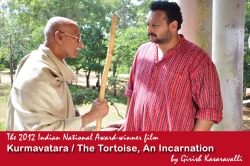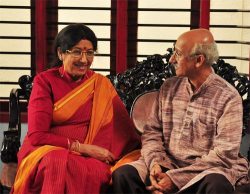Archive for the ‘Kannada’ Category
Indian art cinema
Posted: July 18, 2017 in Assamese Cinema, Bengali films, Bhabendranath Saikia, Books, Girish Kasarvalli, Kannada, Malayalam, Mrinal Sen, North East Cinema, Regional, Ritwik Ghatak, Satyajit Ray, Shyam Benegal, South Indian cinemaDevara Kadu (Kannada, 1993)
Posted: June 26, 2017 in Environment, Kannada, Regional, Two Hundred Indian filmsDEVARU KADU is a film written and directed by Pratibha Ram Reddy. It is a heart-rending tale of a family’s battle for survival. Upon losing his father, the protagonist Deva and his mother leave their native place in the forest & go to the city in search of livelihood. While the mother works in other people’s houses, the young boy added to the kitty by doing odd jobs as a rag-picker. Finally when he grows up, he takes a loan and purchases a rickshaw and lugs it to make his living.
In the meanwhile, health of his mother deteriorates and she longs to go back to her native place. Deva attempts to carry out her final wish, but she die during the return journey. Deva buries her ‘ashes’ besides that of his father’s grave. Hereafter, Deva starts growing trees in the surrounding areas (as per the wishes of his parents & manage to convert the barren land which his family had to abandon to seek greener pastures in the city) and within forty years, a forest emerges out of his extraordinary efforts.
Quite a powerful film, this.
Rating: 4 out of 5
Hoomale (Kannada, 1998)
Posted: May 28, 2017 in Assamese Cinema, Kannada, North East Cinema, RegionalYesterday I was watching a Kannada film titled HOOMALE. It was basically a tale of love between an infatuated young man and a widow set in the backdrop of Assam. Having grown up in the North East, I have a fair knowledge of the region. Watching this particular film left me quite shaken …
I felt the film directed by one S. Chandrasekhar projected Assam in the most callous way. A particular sequence has the protagonist celebrating Karnataka Day in Guwahati. During the celebration, a toast was being raised with the vow that “Karnataka should not be allowed to go the Assam and Jammu & Kashmir way.” The horrifying situation that was shown in the film is mostly an exaggeration that can be felt by anyone familiar with the region.
Filmmakers ought to be sensitive when they make films incorporating developments and cultures of different states of the country. This would unquestionably lead to a much needed National integration in the truest sense. If interested, you may catch this movie today @ 2pm in Lok Sabha TV.
I was surprised that the film was given National award for Integration. OMG!!!
NAYI NERALU (In the shadow of the dog, 2006)
Posted: July 3, 2016 in 100 remarkable Indian films, Girish Kasarvalli, Kannada, Regional, Satyajit Ray In some respects, Girish Kasarvalli’s NAYI NIRALU (In the Shadow of the Dog) is similar to Satyajit Ray’s APUR SANSAR. The final sequence where the heroine Venku holds her little child that she must raise and provide for bears similarity to Apu holding his son aloft signifying that lives must go on inspite of personal tragedies that transpired in their lives. In APUR SANSAR Apu loses his wife, in NAYI NERALU the protagonist Venku lost her husband who had drowned around two decades back. Since then she had been living with her in-laws …
In some respects, Girish Kasarvalli’s NAYI NIRALU (In the Shadow of the Dog) is similar to Satyajit Ray’s APUR SANSAR. The final sequence where the heroine Venku holds her little child that she must raise and provide for bears similarity to Apu holding his son aloft signifying that lives must go on inspite of personal tragedies that transpired in their lives. In APUR SANSAR Apu loses his wife, in NAYI NERALU the protagonist Venku lost her husband who had drowned around two decades back. Since then she had been living with her in-laws …
Kasarvalli’s film focuses on reincarnation, conventional beliefs and question several social traditions. The rural backdrop of the film is quite spectacular in parts and add to its charm. In this film, I noticed that a widowed lady wears red saree (specific to South Indian tradition?) whereas we’re used to seeing widows in ‘whites.’
The film narrates the tale of a young man Vishwa who proclaims that he was the reincarnated son of a respected person of a certain village in the neighborhood in his earlier birth. When Vishwa comes to the house of the Father of his declaration complexities arise and orthodox beliefs bug at every step. Watch this fine film by the renowned filmmaker of MANE.
Rating: 4 out of 5
Kumravatara
Posted: December 11, 2012 in Girish Kasarvalli, Kannada, Regional, Two Hundred Indian filmsKurmavatara (Lord Vishnu’s second avatar) is a film directed by renowned filmmaker Girish Kasarvalli.Itis based on a short story written by K Veerabhadrappa. It is a tale of an upright, Govt. clerk with a striking resemblance to the “Father of the Nation,” who receives an offer from a TV director to play the “Mahatma,” and agrees to take up acting much against his wishes and largely due to the persuasion of his son and daughter-in-law. The languid pace of the film conceals a hard-hitting statement, contrasting the honesty and idealism of the older generation with the newer, living in a modernized, corrupt materialistic world. At another level, this film-within-a film also highlights the difficulties an actor faces while enacting the character, especially someone who is new to the profession, unable to appreciate need for emotions etc.
Some scenes do appear a bit contrived. The fact that our protagonist was immune to the need of his wife and even oblivious of the need to be supportive when his wife was undergoing chemotherapy (as revealed to us through a conversation he has with his son later) seemed clichéd. The sequence between the protagonist and his grandson was refreshing.

Kurmavatara, directed by Girish Kasaravalli and produced by Basant Kumar Patil, won the best Kannada film award. In an interview to the Deccan Herald, Kasaravalli told that the honour “has come as a reward for the hard work that went into making the film.”
Kasaravalli won his third National Award in a row for the best Kannada film with Kurmavatara in 2012, taking his total number of National Awards to 12. His films Gulabi Talkies and Kanasemba Kudureneri won the National Awards in the two preceding years.
Rating: 3.8 out of 5
Some more information:

